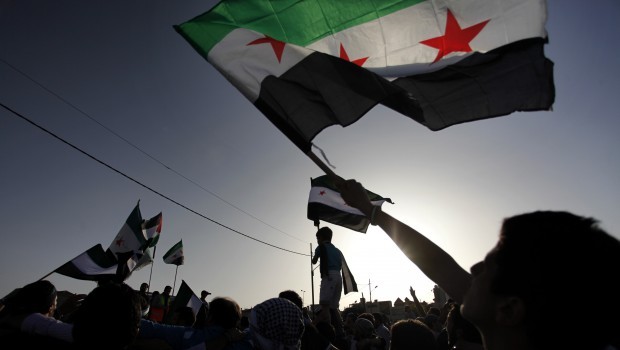The Gulf states, particularly Saudi Arabia and Qatar, did well to be extremely supportive of the popular uprising in Syria. These states are credited as being pioneers in providing the Syrian Revolution with solid support at all its junctures, from media, diplomatic, humanitarian and financial support to both direct and indirect military aid.
The Gulf states were not unaware of the hardships caused by their decision, given the long experience they have with the ruling regime in Damascus that justifies the unethical use of unrestrained and excessive violence as a means to remain in power. For social and religious reasons, the 1982 Hama massacre continues to live on in the Gulf’s collective memory, dominating the public image of the Syrian regime among people of the Gulf from all walks of life.
Without doubt, the Gulf states see the struggle in Syria as highly significant in regards to their struggle against their strategic opponent in Tehran; Iran’s generous support of the Assad regime, whose survival is part and parcel of its national security, proves my point.
The moral incentive, however, to the Gulf’s support for the Syrian revolution should not be forgotten. The official support in the Gulf in fact reflects the attitude of the public, demanding—through its own means—that their governments give more support to the rebels in Syria. Without exaggeration, it is assumed that the Gulf stance—particularly in Saudi Arabia and Qatar—is a perfect example of the direct correspondence between the cold geopolitical interests of politicians and the warm emotions of people.
Because the Syrian regime is committed to what Bismarck called the policy of “Blood and Iron”—which the so-called Father of Germany launched maintain his country’s unity—the Gulf States, after some hesitation, had no choice but to call for arming the rebels so they could defend themselves. Gradually, it became apparent that the Assad regime was determined to remain in power even if it meant the destruction of Syria on both social and geographical levels. Thus we were thunderstruck when, ironically, the leader of the largest Pan-Arab party began the most destructive offensive ever launched against an Arab country.
Although the Gulf states’ decision to support the revolution was right, displaying a remarkable regional leadership and effective international efforts, it shows some signs of weakness that threaten its outcome.
Among these weaknesses is a need for coordination between the Gulf States regarding their stances towards the Syrian revolution and which rebel factions deserve political and military support, as well as the form and timing of this support.
Another weakness is the Gulf’s failure to persuade its traditional friends in Europe and the US that its diagnosis of the Syrian crisis is correct and to urge them to shake off their hesitation.
The negativity of the US and Europe has been costly for Syrians, Gulf diplomacy and the image of the West in the region. This negativity has also helped fulfill the West’s own prophecies of the spread of extremism and sectarianism in Syria.
Without question, one of the weaknesses of the Syrian revolution lies in the discrepancy in vision and the lack of determination among its key allies. Arguably, Gulf diplomacy could have settled these differences. On the other hand, although the regime’s allies are individually less numerous and influential, they continue to maintain a unified stance.
The Syrian crisis has also revealed that the political and diplomatic ties that the Gulf States established years ago with Beijing and Moscow did not enable them to persuade these two countries of their diagnosis of the situation in Syria. Moscow, for example, did not even reduce its marked bias towards the Syrian regime, prompting the Gulf states to urgently review their strategic relations with China and Russia.
In short, despite their diplomatic success in mobilizing international support for the Syrian revolution, the Gulf states’ efforts remain by far less successful than their efforts to resolve the Yemeni crisis. Despite the major differences between the two scenarios, in Yemen the Gulf states managed to mobilize international support for a transition of power.
Syria today is lost in a disastrous state of war between the regime and the rebels. With the regime and its allies giving priority to a military solution, the backers of the rebels have no choice but to uphold their decision to topple the regime and raise the level of both military aid and financial support and neutralize the role of Russia and China.
Any political solution to the crisis in Syria that fulfills the aspirations of the rebels should be preceded by efforts to break the regime’s determination to fight. All alternatives are harsh, with the country in the midst of disaster thanks to the regime and allies. The survival of the regime and the continuation of guerilla warfare would mean that the country would slide into a bottomless abyss.
If the progress of a country depends on the amount of its sacrifices, as Hegel said, perhaps a new Syria will emerge from this bloodbath, removing the Assad mafia from power and opening up new horizons for Syrians. However, this will not happen unless the backers of the revolution stand together and adopt a unified policy of determination and steadfastness.
The “Geneva II” conference will not produce anything tangible. It has been aborted in Al-Qusayr by Assad and his allies, confirming that the only remaining language in the struggle is that of “Blood and Iron.”
The counterpart to this article can be read here.

saudi arabia had purchaed more airpower that can over run russia , iran and syria and could easily changed the course how come they did not missmanage the war toward syria and waited OBAMA to act on their bhave.